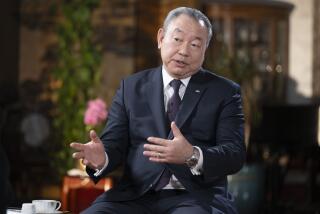Taiwan Reforms Set; China Talks Sought : Asia: The new president’s speech marks a break with 40 years of policy by the Nationalists.
- Share via
TAIPEI, Taiwan — President Lee Teng-Hui today announced a plan for sweeping democratic reforms on Taiwan and expressed hope that Taipei and Beijing will ultimately open talks on reunification of the island with the Chinese mainland.
Although Lee attached conditions that would rule out any possibility of Taipei-Beijing negotiations beginning soon, his speech marked a break with Taiwan’s 40-year-old refusal to consider opening negotiations with the Communist regime in Beijing.
Lee’s remarks, made in an inaugural address for a new six-year presidential term, fit a pattern of growing contacts between Taiwan and China.
Taiwan, which officially calls itself the Republic of China, is ruled by the Nationalist government that fled to the island in 1949 after losing a civil war on the mainland to the Communists.
Lee, who was inaugurated in a 30-minute ceremony at the Sun Yat-sen Memorial Hall in Taipei, also announced that he intends to declare an end to the four-decade-old “Period of Mobilization for the Suppression of the Communist Rebellion.”
Laws based on this official act give the Nationalist Party a constitutionally unchallengeable grip on power. Lee’s planned action would undercut the current legal basis for Nationalist rule and require extensive constitutional revisions of procedures of parliamentary and presidential elections.
In his speech this morning, Lee first reiterated his government’s stance that “Taiwan and the mainland are indivisible parts of China’s territory, and all Chinese are compatriots of the same flesh and blood.”
He then expressed the view that in light of worldwide changes in Communist systems, it is possible that China could accelerate political and economic reforms in a way that would create conditions for reunification.
“We sincerely hope that the Chinese Communists will . . . quicken their pace and boldly march toward the goals of political democratization, economic liberalization and social pluralization,” Lee said.
“If the Chinese Communist authorities can recognize the overall world trend and the common hope of all Chinese, implement political democracy and a free economic system, renounce the use of force in the Taiwan Strait and not interfere with our development of foreign relations on the basis of a one-China policy, we would be willing on a basis of equality to establish channels of communication and completely open up academic, cultural, economic, trade, scientific and technological exchange, to lay a foundation of mutual respect, peace and prosperity,” he said.
“We hope then, when objective conditions are ripe, we will be able to discuss the matter of our national reunification, based on the common will of the Chinese people on both sides of the Taiwan Strait.”
On the subject of constitutional reform, Lee called for establishing “a great model of political democracy” to be completed within two years. He called for termination of the official anti-Communist mobilization order “in the shortest possible period of time, but he implied that this could be done only after revision of the constitution.
As Lee spoke, students and opposition party activists began gathering in another part of Taipei for an afternoon protest against his recent selection of a retired military general, Defense Minister Hau Pei-tsun, to be Taiwan’s next premier.
Hau, although viewed as a hard-line conservative leader, made a ground-breaking diplomatic gesture last week by declaring that it is a “reality” that China is “one country” with “two governments.” Taiwan has never formally recognized the legal existence of the Beijing government.
More to Read
Sign up for Essential California
The most important California stories and recommendations in your inbox every morning.
You may occasionally receive promotional content from the Los Angeles Times.










